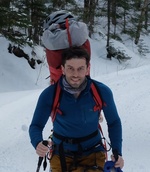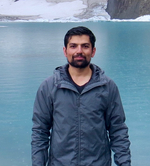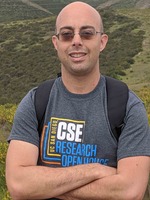About the Authors

Hamed Hatami
Associate professor
Department of Computer Science
McGill University
Montreal, Quebec, Canada
hatami[ta]cs[td]mcgill[td]edu
https://www.cs.mcgill.ca/~hatami/
Associate professor
Department of Computer Science
McGill University
Montreal, Quebec, Canada
hatami[ta]cs[td]mcgill[td]edu
https://www.cs.mcgill.ca/~hatami/
Hamed Hatami
received his Ph.D. from the Department of Computer Science at the University of Toronto in 2009 under Michael Molloy and Balázs Szegedy. Afterward, he became a Veblen fellow at the Institute for Advanced
Study and the Department of Mathematics at Princeton University until 2010. Since 2010 he has been on the faculty at the School of Computer Science at McGill University. His research focuses on the applications of mathematical analysis to theoretical computer science and combinatorics.

Kaave Hosseini
Assistant professor
Department of Computer Science
University of Rochester
Rochester, New York, USA
kaave[td]hosseini[ta]rochester[td]edu
https://www.cs.rochester.edu/u/shossei2/
Assistant professor
Department of Computer Science
University of Rochester
Rochester, New York, USA
kaave[td]hosseini[ta]rochester[td]edu
https://www.cs.rochester.edu/u/shossei2/
Kaave Hosseini received his Ph.D. from the
Department of Computer Science and Engineering at University of California, San Diego in 2019 under the supervision of
Shachar Lovett. Then he was a postdoctoral associate in the Department of Mathematical Sciences at Carnegie Mellon University until 2021. Since 2021, he has been on the faculty in the Department of Computer Science at
the University of Rochester. His research interests are in additive combinatorics, pseudo-randomness, and their applications in algorithms and computational complexity.

Shachar Lovett
Associate professor
Department of Computer Science
University of California San Diego
San Diego, California, USA
slovett[ta]ucsd[td]edu
https://cseweb.ucsd.edu/~slovett/home.html
Associate professor
Department of Computer Science
University of California San Diego
San Diego, California, USA
slovett[ta]ucsd[td]edu
https://cseweb.ucsd.edu/~slovett/home.html
Shachar Lovett received his Ph.D. from the
Weizmann Institute of Science in 2010 under the supervision of
Omer Reingold and Ran Raz. He was a postdoctoral researcher at
the Institute for Advanced Study until 2012. Since 2012, he has been
on the faculty at the University of California, San Diego. He is a
recipient of an NSF CAREER award and a Sloan fellowship.
His research is broadly in theoretical computer science and
combinatorics. In particular: computational complexity, randomness and
pseudo-randomness,
algebraic constructions, coding theory, additive combinatorics and
combinatorial aspects of high-dimensional geometry.
He is happily married and has four kids.
